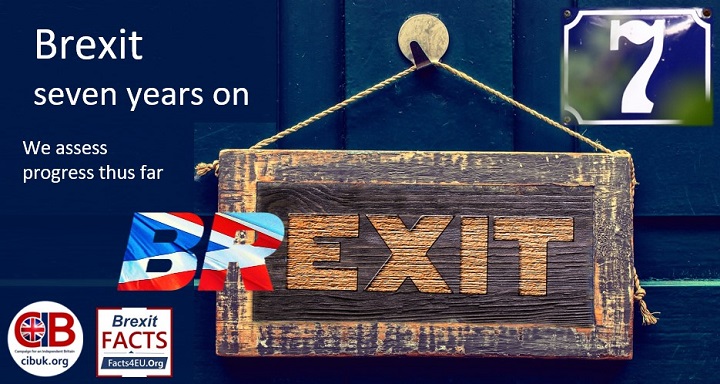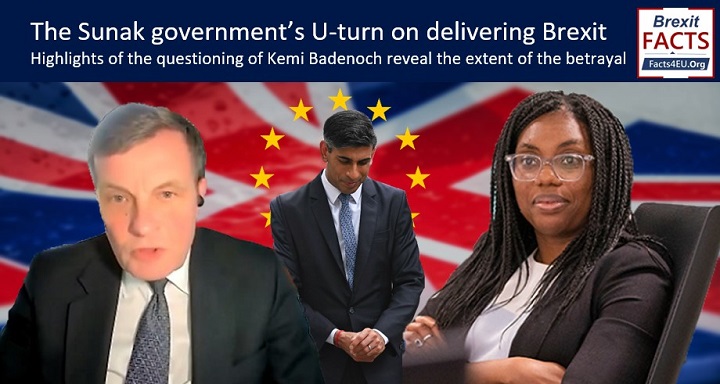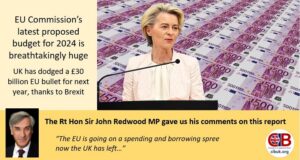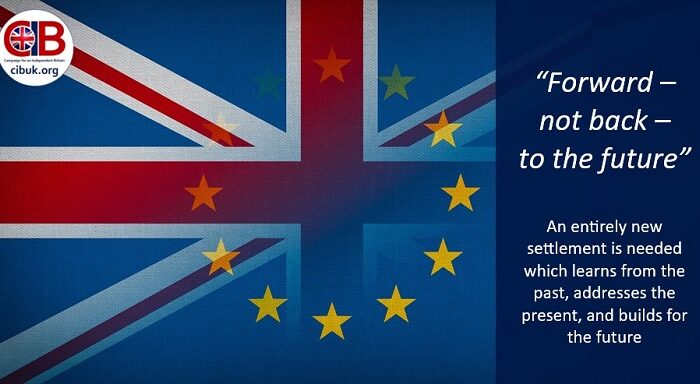“Brexit seven years on. Your CIBUK assesses progress thus far.”

CIBUK – NEWSLETTER
“Brexit seven years on. Your CIBUK assesses progress thus far.”
“Bliss it was that dawn to be alive,
But to be young was very heaven.”
– William Wordsworth, The Prelude
As we pass the seventh anniversary of the UK’s momentous decision to leave the European Union on 23rd June 2016, it is quite right that we pause and reflect on the tumultuous events that have taken place since that historic vote and assess where this country now finds itself.
On the night of the vote the weather matched the political omens. A torrential downpour– which may have deterred some from casting their vote – eventually gave way to bright sunshine the following morning, as those of us who pulled an all-nighter in pursuit of freedom burst out of our campaign headquarters to celebrate the result with a champagne breakfast in the nearest café.
.
‘We’re out!’
With a heavy heart, the BBC finally conceded defeat and announced the country’s decision to leave the European Union at 04:40 on Friday 24th June 2016.
Oh to behold the look on their faces when the result was announced! Dimbleby looked grim, Kuenssberg miserable, Mandelson and Blair both ashen, Osborne and Cameron pinched and crestfallen. Each one despatched in a moment by a country now heartily sick of its political masters and intent on scattering them to the four winds.
Taxis hooted, Leavers cheered and activists punched the air as they emerged from offices thick with smoke and streamers – to take their message across the river, where their opponents – perched high in press gantries above College Green – sat huddled in disbelief at what had just happened.
‘Take Back Control’
This was the great rallying cry around which the campaign hinged, specifically taking back control of our laws, our borders and our money.
How successful has Britain been in reasserting control in these vital areas in the intervening period? The picture, as ever is mixed. Like the curate’s egg it is good in parts. But only in parts. For our readers’ convenience we provide a summary assessment of the government’s record so far and we highlight the headline issues the UK must fully address if it is ever to realise its full potential outside the EU.
‘Control of our laws’
“What Brexit was about was the restoration of democratic control for the people of the United Kingdom.”
(Rt. Hon Jacob-Rees Mogg MP)
Sovereignty
As the former Brexit Secretary has repeatedly reminded us, now we are out of the European Union we are finally able to make and unmake our own laws. That in itself represents a huge achievement and an enormous change to the way we have been governed over the past fifty years. The implications going forward could be profound.
It is therefore encouraging to be able to cite examples where the British government has indeed begun to ‘take back control’- displaying the kind of policy initiative and flexibility we all wish to see across the board.
The Vaccine Roll-out
Roundly condemned for the manner of parts of its public procurement plan during Covid, the UK government’s speedy vaccine roll-out programme has been generally praised, in marked contrast to the sluggish response from the EU.
- Following the emergence of the Omicron variant, 1 million booster vaccinations a day were being achieved by the end of December 2021
- This was significantly higher than the 4m vaccinations per week being achieved earlier on in the Spring of 2021.
- The fact that the EU considered banning exports of the Covid vaccine to the UK and disrupting prior-existing contractual responsibilities in the process, shows how utterly chaotic and cavalier their approach to the pandemic had been.
8/10
Free Trade Deals
Credit too must be given to the UK government for its ambition in signing the Trans-Pacific Trade Agreement (CPTPP), a free trade agreement (FTA) between 11 countries around the Pacific Rim.
These include Canada, Mexico, Peru, Chile, New Zealand, Australia, Brunei, Singapore, Malaysia, Vietnam and Japan.
These agreements are in their infancy and it remains to be seen how significant they prove. Nonetheless the government’s economic, geographical and strategic ambitions in this area are impressive and to be commended.
7/10
De-regulation & the Retained EU Law Bill
The same however cannot be said for the slow and laborious manner in which the Secretary of State and her officials are going about revoking current EU law with a view to freeing up British business.
As Sir Bill Cash MP, head of the European Scrutiny Committee pointed out, we have reached a situation where “the government’s policy in effect changed from one where retained EU law is revoked unless specifically saved to one where retained EU law is saved unless specifically revoked.”
 We are grateful indeed to stalwart Brexiteer David Jones MP for the forensic way in which he exposed the Secretary of State’s decision to reverse this presumption in a compelling exchange which can be viewed in full here.
We are grateful indeed to stalwart Brexiteer David Jones MP for the forensic way in which he exposed the Secretary of State’s decision to reverse this presumption in a compelling exchange which can be viewed in full here.
5/10
Financial Services
CIBUK are indebted to its former Vice-Chairman and National Committee member Professor Daniel Hodson for his insight into the potential benefits of financial de-regulation, now the UK is free from the EU regulatory regime and able to pursue a common law approach.
Seven years on the possibilities and benefits for the City “remain at least partially unfulfilled but very much within reach.”
As in so many other policy-related areas, whether the UK chooses to realise these benefits outside the EU remains to be seen.
6/10
Defence
Ukraine
The UK’s response to the threat in Ukraine has been commendable in its speed and impact. Assuming its role as a leading NATO player, the UK has been in the vanguard in protecting Western freedoms, in marked contrast to the confused and ambiguous response from some of its European allies.
8/10
PESCO
On other defence matters however, not all appears to be as we thought. Repeated assurances that the UK would not acquiesce to a common EU foreign and defence body now appear much less convincing than they did.
The UK’s emphatic decision to stay outside the EU Permanent Structured Co-operation (PESCO) has now changed.
“In July 2022 the UK applied to join PESCO’s Military Mobility project. That application was approved by the participating EU states in early October and formal approval was subsequently given at a meeting of EU Defence Ministers on 15 November.” (House of Commons Library)
That the UK should even think of compromising its defence and security policy by joining an ill-defined common EU defence force defies belief. Recent events have surely proven what works – and what doesn’t.
5/10
Northern Ireland
Further examples of the UK’s craven, hide-bound EU mindset are there for all to see when it comes to parts of the United Kingdom.
The Windsor Agreement is a blatantly unsatisfactory compromise to reach an accord with the EU over the status of Northern Ireland within the United Kingdom despite the Prime Minister’s best spin on events.
In reality, the agreement is a capitulation, and the Province remains unambiguously within the ambit of the European Union.
3/10
‘Control of our money’
Cost of Annual EU Membership
Continually overlooked by Remainer-Rejoiners, the fact that the UK no longer has to pay an exorbitant annual membership fee for the ‘privilege’ of EU membership is one that needs to be repeated over and over again.
 Given the levels of debt now accruing in the EU as a result of the pandemic the UK has dodged a very large financial bullet indeed.
Given the levels of debt now accruing in the EU as a result of the pandemic the UK has dodged a very large financial bullet indeed.
If that were not a high enough price, the UK would also be required to adopt the euro as a pre-condition for re-joining the EU along with the net liabilities of Europe’s debtor states.
Whatever this government’s other EU policy failures, we are at least mercifully saved this one. At least for now.
7/10
‘Control of our borders’
Immigration
And so to the biggest betrayal of them all. It is hard to exaggerate the sense of anger now engulfing this country as the government (supposedly) attempts to grapple with a problem which is fast becoming an existential crisis.
When, as Prime Minister, David Cameron promised to reduce migration to the tens of thousands, people actually believed him. Now those words sound like a sick joke.
Our current Prime Minister appears indifferent, even complacent at the armada of boats now making their way across the Channel.
And that of course is just the illegal migrants. Net legal-migration to June 2022 was 600,000. That is to say one million people came to this country and 400,000 left.
 These figures are shocking, outrageous. And compounded by the huge numbers that continue to pour in from EU and EEA nationals.
These figures are shocking, outrageous. And compounded by the huge numbers that continue to pour in from EU and EEA nationals.
The issue is so important because it affects every other public policy, from transport and housing to school and hospital places. There is no area of public life which is left unaffected.
We can only repeat what we said in our previous newsletter.
‘Something must be done.’
0/10
 NEW: Progress update on our BREXIT Documentary
NEW: Progress update on our BREXIT Documentary
– the positive case for the UK
Fighting back for a free, traditional & independent United Kingdom and how can you make a difference – don’t miss it!
There is, as ever, much else to say on many other topics to which we shall return. But even in the policy areas we have selected, there remains much, much more to be done.
Time is running out before the British people once again deliver their verdict and cast their vote in the next General Election. It is up to all of us in the meantime to make our views known as widely and clearly as possible, so that those in charge finally get the message and carry this country in the direction we all wish to see.
 By Ben Philips, Communications Director, CIBUK.org
By Ben Philips, Communications Director, CIBUK.org
Main image : Montage © CIBUK.Org 2023




